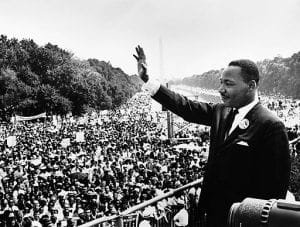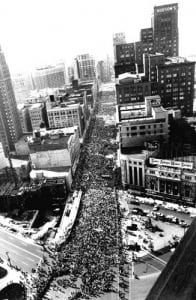Remembering MLK
“We can’t solve our problems unless there is a radical redistribution of economic and political power.” — The Rev. Martin Luther King Jr., 1967
On the third Monday of January, every year, the U.S. celebrates Martin Luther King Jr.’s birthday. MLK Day, as it is known colloquially, officially became a federally recognized holiday in 1983, though it was first proposed by Representative John Conyers (D-MI) in 1968 four days after Dr. King was killed. Conyers introduced the bill to Congress every year for 15 years. MLK Day was first observed as a federal holiday in 1986 but wasn’t recognized by all 50 states until 2000. Even then, several states chose to combine MLK’s holiday with celebrations of Confederate figures.
Approval of a federal holiday recognizing Dr. King was a feat only made possible by the passage of time and the softening of MLK’s legacy in the nearly 20 years between his death and observance of the first holiday in 1986. In the 35 years since then, King’s legacy has undergone a thorough whitewashing that ignores his advocacy of the poor, his anti-war protest, quotes him out of context, and twists his words to support the very things King spent his life fighting against.
This generic, toothless, imagining of Dr. King ignores his more critical writing, his designation as “the most dangerous Negro” by the FBI, and his unpopularity among white people during his lifetime. In a 1966 poll, more than 60% of the public rated King negatively and in a poll following his 1968 assassination, 31% of the public felt "he brought it on himself.”
It is worth remembering the true legacy of Martin Luther King Jr., the man who believed in direct action, who drew attention to the injustices of racism, war and poverty by organizing Black citizens and allies to protest on buses, in libraries, at lunch counters and through marches. The following quotes, still relevant today, highlight the injustices Dr. King sought to right and the clarity and forthrightness in which he spoke of them.
In His Own Words
“I am now convinced that the simplest approach will prove to be the most effective—the solution to poverty is to abolish it directly by a now widely discussed matter: the guaranteed income… The curse of poverty has no justification in our age. It is socially as cruel and blind as the practice of cannibalism at the dawn of civilization when men ate each other because they had not yet learned to take food from the soil or to consume the abundant animal life around them. The time has come for us to civilize ourselves by the total, direct and immediate abolition of poverty.” – Where Do We Go from Here, 1967.
“Now let me say that the struggle for Civil Rights and the struggle to make these two Americas one America, is much more difficult today than it was five or ten years ago… But we must see that the struggle today is much more difficult. It's more difficult today because we are struggling now for genuine equality. It's much easier to integrate a lunch counter than it is to guarantee a livable income and a good solid job. It's much easier to guarantee the right to vote than it is to guarantee the right to live in sanitary, decent housing conditions. It is much easier to integrate a public park than it is to make genuine, quality, integrated education a reality.” - The Other America speech, 1967
“I submit that however unpleasant it is we must honestly see and admit that racism is still deeply rooted all over America. It is still deeply rooted in the North, and it's still deeply rooted in the South. And this leads me to say something about another discussion that we hear a great deal, and that is the so-called 'white backlash.' I would like to honestly say to you that the white backlash is merely a new name for an old phenomenon. It's not something that just came into being because of shouts of Black Power, or because Negroes engaged in riots in Watts, for instance. The fact is that the state of California voted a Fair Housing bill out of existence before anybody shouted Black Power, or before anybody rioted in Watts.” - The Other America speech, 1967
“I contend that the cry of 'Black power' is, at bottom, a reaction to the reluctance of white power to make the kind of changes necessary to make justice a reality for the Negro. I think that we've got to see that a riot is the language of the unheard.” - 60 Minutes interview, 1966
“Perhaps a more tragic recognition of reality took place when it became clear to me that the war was doing far more than devastating the hopes of the poor at home. It was sending their sons and their brothers and their husbands to fight and to die in extraordinarily high proportions relative to the rest of the population. We were taking the Black young men who had been crippled by our society and sending them eight thousand miles away to guarantee liberties in Southeast Asia which they had not found in southwest Georgia and East Harlem. And so we have been repeatedly faced with the cruel irony of watching Negro and white boys on TV screens as they kill and die together for a nation that has been unable to seat them together in the same schools. And so we watch them in brutal solidarity burning the huts of a poor village, but we realize that they would hardly live on the same block in Chicago.” - Beyond Vietnam speech, 1967
“Whites, it must frankly be said, are not putting in a similar mass effort to reeducate themselves out of their racial ignorance. It is an aspect of their sense of superiority that the white people of America believe they have so little to learn. The reality of substantial investment to assist Negroes into the twentieth century, adjusting to Negro neighbors and genuine school integration, is still a nightmare for all too many white Americans.” - Where Do We Go From Here, 1967
“We must recognize that we can’t solve our problem now until there is a radical redistribution of economic and political power… This means a revolution of values and other things. We must see now that the evils of racism, economic exploitation, and militarism are all tied together… you can’t really get rid of one without getting rid of the others… the whole structure of American life must be changed. America is a hypocritical nation and [we] must put [our] own house in order.” - Report to SCLC Staff, May 1967.
Reflecting on His Legacy
While far too many people have been told that Dr. King wouldn’t condone the actions of movements such as Black Lives Matter, reading a more complete account of his words and actions paints a different picture. Dr. King’s life and words continue to inspire those who seek justice, and are relevant every day of the year.
For more information about Martin Luther King Jr.'s life and legacy, read any of these books by and about him.




Add a comment to: MLK Jr. Then vs. Now